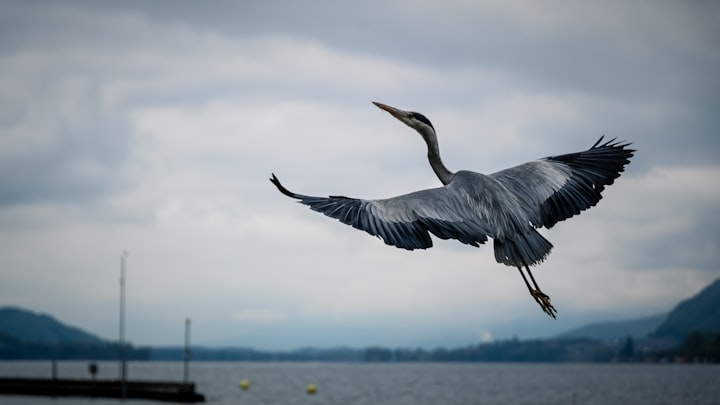The stork
A timely reminder to act, not just contemplate.

A white stork stands stock still, perfectly balanced on one leg, in the mudflats off the coast at low tide.
The stork appears to be thinking deeply, contemplating the meaning of life. Perhaps it is deciding on its next course of action. But it is also possible that it is just being a stork.
Apart from probing deeply into the mud for food with its perfectly designed beak, much of a stork’s life is spent balancing on one leg, as inert as a statue, seemingly contemplating … something.
Looking like a Chinese watercolour of an ancient river scene.
White stork, grey sky, flat ocean. Smudged shades of greys and charcoals. A fishing vessel in the background.
One day this stork will, of course, simply die. The oldest known wild white stork lived for 39 years.
A thought comes to me while observing this bird, perfectly still in the glassy setting.
An epiphany, perhaps.
The stork’s life parallels my own.
A rough poem starts to formulate …
A stork stands
Stock still
In the mudflats off the coast
It stands
Perfectly balanced on one leg
Stock still
In the mudflats off the coast
The stork stands
Contemplating
What it contemplates,
we do not know
But we do know
That while it spends
The best part of its life contemplating
It is not ‘doing’
Or something like that.
You get my point.
I have become a stork, contemplating at the expense of doing.
There is a time for contemplation and there is a time for action. Both are important, or at least that is what I believe.
When the balance is gone, however, one can ‘act’ without enough contemplation. Or (like me), contemplate too much, at the expense of acting.
A stork is a stork. It balances both physically and metaphorically because that is what storks do. They physically balance on one leg, stock still, and sometimes they find food and eat. They appear to be thinking. But nobody really knows, because we are not storks, and they don’t speak any language that we can understand. It is okay for them to spend much of their life seeming to contemplate because that is what storks do. It is what they have always done, and survival aside, the natural world does not demand much more of them.
We, on the other hand, have this frustrating gift which we call ‘self-awareness’.
We know that one day we will die, so there is an increasing sense of urgency as we age to create something, to leave a legacy. We want to validate our existence so that something of us remains after our physical body is gone.
I watch the stork out on the grey glassy-smooth mudflats. I envy the lack of urgency, but ironically its leisurely contemplation reminds me that I don’t have forever. Another birthday looms in the not-too-distant-future.
Contemplation is good but so is action.
So, when we return home I will fuel up the mower and mow the lawn. I will take time to notice the fragrance of freshly mown grass, the ache in my shoulders, and the discernible difference that I have made to the appearance of the yard.
Mowing is rewarding like that. There is a rapid and noticeable return for one's efforts, especially when the lawn is overdue for a trim.
And then I write. Thoughts which are never written or spoken are gone, sometimes forever.
Dust in the wind. Leaves in the wind.
Whatever cliché you prefer.
I mow. I write.
I act and validate my existence.
I may be a stork but now I'm starting to fly.
About the Creator
Michael Halloran
Educator. Writer. Appleman.






Comments
There are no comments for this story
Be the first to respond and start the conversation.